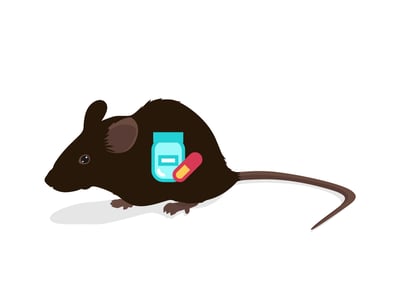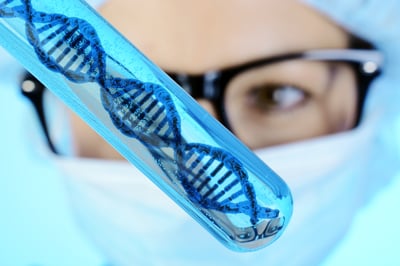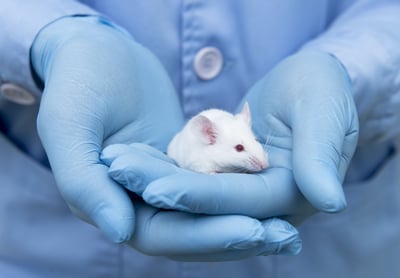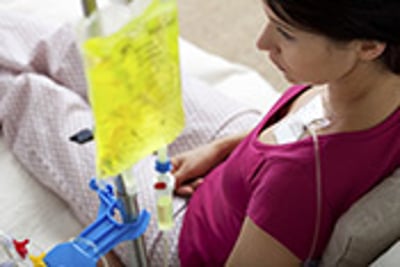FORCE's eXamining the Relevance of Articles for You (XRAY) program looks behind the headlines of cancer news to help you understand what the research means for you.
XRAY is a reliable source of hereditary cancer research-related news and information.
Learn more about the XRAY program
Metastatic Breast Cancer
Relevance: Medium


Strength of Science: Medium-High


Research Timeline: Human Research


Study : Metastasis is affected by wound healing and inflammation in study on mice
Relevance: Medium


Strength of Science: Medium-High


Research Timeline: Human Research


Most relevant for: Cancer patients who will be, or have recently undergone surgery
This study in mice looked at how wound healing after surgery affects metastasis. Researchers found that wound healing caused changes in the mouse immune system that allowed some cancer cells to grow, but that treatment with a non-steroidal anti-inflammatory drug (NSAID) reduced inflammation and frequency of metastases. While this research is promising, it remains to be seen if similar effects occur in humans. (5/17/18)
Read More
Relevance: Medium-High


Guideline : American Heart Association examines the challenges of cardiovascular disease and breast cancer
Most relevant for: People diagnosed with breast cancer
Current breast cancer treatments can negatively affect cardiovascular health. Recently, the American Heart Association released its first scientific statement on cardiovascular disease and breast cancer. This statement includes a comprehensive overview of the prevalence of both diseases, shared risk factors, cardiotoxic effects of therapy and the prevention and treatment of cardiovascular disease in breast cancer patients. (5/2/18)
Read More
Relevance: High


Quality of Writing: High


Article : The right not to know when not knowing is dangerous
Most relevant for: People with Icelandic heritage
Healthcare providers are bound by the guiding principle of doing no harm. But how does this concept apply to their patients who have not consented to genetic testing or who do not want to know their results? In that case, is providing test results more harmful or not? Anna Clausen explores these issues in the context of breast cancer gene testing in her Global Health Now article “The Right Not to Know: When Ignorance is Bliss but Deadly.” (4/20/18)
Read More
Relevance: Medium


Research Timeline: Post Approval


Update : FDA approves at-home test kits for inherited cancer: how useful are they?
Most relevant for: People who are considering or have had direct-to-consumer testing through 23andMe
Genetic testing for health conditions (such as risk for cancer) typically requires a prescription from a doctor. Until recently, direct-to-consumer (DTC) genetic testing has focused on tests to learn your ancestry and find of unknown branches of family trees. A laboratory called 23andMe that provides direct-to-consumer genetic testing has been given FDA approval to report results for 3 mutations found in the BRCA1 and BRCA2 genes. The FDA statement provides details about this approval and warns people about the limitations of the 23andMe test. (03/19/18)
Read More
Relevance: Low


Strength of Science: Medium


Research Timeline: Animal Studies


Study : Is asparagus linked to breast cancer metastasis?
Relevance: Low


Strength of Science: Medium


Research Timeline: Animal Studies


Most relevant for: People diagnosed with breast cancer
A study published in the journal Nature shows that asparagine, a protein building block that takes its name from asparagus, promotes the spread of breast cancer in mice. The study by cancer experts from Britain, Canada and the U.S. investigated whether limiting the levels of asparagine in mice could reduce tumor metastasis. (3/2/18)
Read More
Relevance: Medium-Low


Strength of Science: Medium-Low


Research Timeline: Animal Studies


Study : Cancer “vaccine” injected directly into tumors works in mice
Relevance: Medium-Low


Strength of Science: Medium-Low


Research Timeline: Animal Studies


Most relevant for: People with advanced cancers
Immunotherapy is treatment that uses the immune system to fight cancer. Still in its infancy, it is a promising therapy that is changing how certain cancers are treated. A new study reports that tumors in lab mice were eliminated when they were injected with two immune system-enhancing agents. This new approach is called in situ (at the original site) vaccination because the injections are given directly into the tumors. It worked on several different types of mouse tumors, including lymphomas and breast tumors. This approach may be safer than conventional immunotherapy because it uses very low doses of the agents and it does not require tumors to have particular markers. (02/23/18)
Read More
Relevance: Medium-High


Quality of Writing: Medium-High


Article : Coping with the financial burden of breast cancer
Most relevant for: People diagnosed with breast cancer
U.S. News & World Report recently talked to three breast cancer survivors, including two young women, about how they handled out-of-pocket costs and other medical expenses after their cancer diagnosis. (Posted 1/4/18)
Read More
Relevance: Medium-High


Strength of Science: Medium-High


Research Timeline: Post Approval


Study : Genetic counseling by phone or face-to-face
Relevance: Medium-High


Strength of Science: Medium-High


Research Timeline: Post Approval


Most relevant for: People referred to a genetic counselor or those considering genetic testing
Results presented at the 2017 American Psychological Association’s annual meeting showed genetic counseling by telephone is as “safe and effective” in long-term psychological and social outcomes compared to traditional in-person counseling for women at risk for hereditary breast and ovarian cancer. This presentation is an update on research published in 2014. (11/29/17)
Read More
Relevance: Medium


Quality of Writing: Medium-High


Article : Mixed reviews of at-home genetic testing
Most relevant for: People who are considering or have had direct-to-consumer testing
National guidelines recommend that patients meet with a genetics expert before undergoing genetic testing for cancer risk. Genetic counseling can help patients decide whether genetic testing is right for them and order the most appropriate test. Once test results are available, genetics experts also help patients understand their results. Over the last decade, the popularity of direct-to-consumer (DTC) genetic testing, such as 23andMe has grown. Some genetic tests are marketed to consumers on television, in print advertisements, and on the Internet. These “at-home” genetic tests give people direct access to their genetic information without first involving a healthcare provider in the process. A recent report outlines the benefits and limitations of DTC genetic testing. (10/20/17)
Read More
Relevance: Medium-Low


Strength of Science: Medium


Research Timeline: Animal Studies


Study : Can chemotherapy before surgery fuel breast cancer metastasis?
Relevance: Medium-Low


Strength of Science: Medium


Research Timeline: Animal Studies


Most relevant for: Newly diagnosed breast cancer patients
Some breast cancer patients are given neoadjuvant (before surgery) chemotherapy. However, some recent studies have raised concerns that neoadjuvant treatment might actually trigger cancer spread in certain situations. In the current study, researchers used mouse models and human breast cancers to explore this possibility. (10/10/17)
Read More